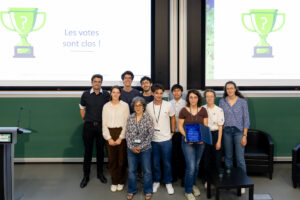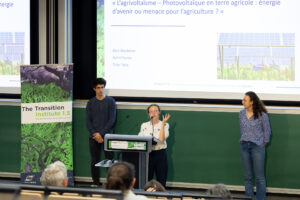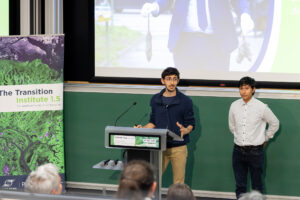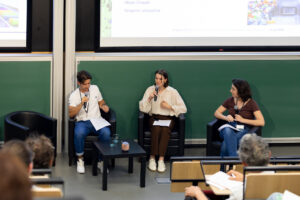The Environmental Controversy Award: active education to understand the challenges of transition


Drawing inspiration from nature to meet environmental challenges has become one of the major themes of public policy, research, and technological innovation. The concept of Nature-Based Solutions (NBS) is now at the heart of thinking on biodiversity, climate, agriculture, and land management. However, this approach also opens the door to numerous controversies that go beyond the scientific realm to touch on ethical, social, and political dimensions.
It was in this context that the TTI.5 Forum was held, a day of discussions where researchers, institutional actors, artists, and students exchanged their views in order to decipher the complexity of today’s environmental challenges. The Environmental Controversy Award encourages young engineers to conduct critical analyses of sensitive issues. The award promotes active learning, preparing students to tackle environmental challenges by integrating social, economic, and ecological dimensions in order to develop innovative and sustainable solutions.

© Frédérique Toulet
Madeleine Akrich, researcher at the Center for the Sociology of Innovation (CSI) at Mines Paris – PSL and head of the “Description of Controversies” course, highlights the educational value of this exercise:
This course has evolved considerably, but it has remained true to its original purpose: to understand the political, economic, and social implications of seemingly technical decisions. One of the key educational objectives is to help students understand that expertise does not come solely from engineers, but also from local stakeholders, citizens, and associations. These different sources of knowledge enrich the discussion and allow for a broader view of problems and solutions. It is, in a way, an antidote to technosolutionism and an invitation to strengthen democracy.
The Controversy Prize rewards student projects that rigorously and nuancedly analyze often complex and polarized environmental debates. This year, three projects were presented:
Agrivoltaism is a hybrid technology that combines agricultural crops and photovoltaic panels on the same plot of land. Presented as a tool for the future by the APER law, this model is attractive because it promises to combine renewable energy production with the resilience of agricultural systems in the face of climate change. In practice, these are adaptable devices that can potentially protect crops from the sun, hail, or frost.
But this solution is far from unanimous. In the field, results vary greatly depending on the type of crop, the installation methods, and the local context. For some, these devices improve yields by limiting the effects of global warming or provide additional income for farmers. For others, they lead to soil artificialization, a loss of autonomy for farmers, and even negative effects on biodiversity. The students therefore questioned the sustainability of these projects and the risks of industrial abuse, asking whether installations should be built on brownfield sites or fertile agricultural land, and whether legislation should be adapted to provide a more detailed framework for these projects.

© Frédérique Toulet
Coexisting with rats in urban areas may seem like an unusual topic, but it is particularly revealing of the tensions between hygiene, urbanity, ecology, and culture. The students looked at the case of Paris, where the visible presence of rats in public spaces, particularly in the run-up to the Olympic Games, has reignited the debate on how to manage them.
Historically, rats have been both tolerated and feared. Long considered carriers of disease, they are now at the center of a controversy involving health, symbolic, and political issues. Their ecological role—particularly in regulating underground waste—is rarely highlighted, while their visibility fuels anxiety-provoking discourse. This project questions our ability to coexist with species considered “undesirable” and, more broadly, our conception of life in cities.

© Frédérique Toulet
The third project, and winner of the prize, explored the promises and limitations of plastic recycling. Presented in the form of staged media debates and expert discussions, the students questioned the capacity of recycling as a key lever for ecological transition. While there appears to be a consensus on this issue, both among manufacturers and in public discourse, a closer analysis reveals multiple tensions.
On the one hand, recycled plastics remain uncompetitive compared to virgin materials, and effective recycling rates are still low worldwide. On the other hand, sorting standards, technological limitations, and logistical flaws are hindering true circularity. Some critics go so far as to call it an illusion of sustainability, which distracts attention from more structural issues such as reducing production, banning single-use plastics, and developing alternative materials. The project thus demonstrates, in an educational, theatrical and humorous way, how a technical solution, however attractive, can also contribute to perpetuating a problematic consumption model if it is not integrated into a systemic vision.

© Frédérique Toulet
Through these projects, the students highlighted often overlooked dimensions: power relations, conflicts of interest, the plurality of expertise, but also the collective imaginaries that shape our environmental choices. By rewarding these analyses, the Environmental Controversy Prize encourages us to think of transition not as a simple technical challenge, but as a societal issue.
This subject is a real lesson in nuance. The accompanying website is a unique resource in the educational landscape, brimming with information. “
Matthieu Mazière, Director of Studies in charge of the Civil Engineering program
By highlighting the richness of controversy, this award promotes active learning based on investigation, the exchange of arguments, and critical analysis. It is a fine example of the commitment of future engineers at Mines Paris – PSL to finding truly informed solutions.

The Transition Institute 1.5 is organising the 1st TTI.5 Environmental Controversy Award. The prize will be awarded for the best study of a controvers...